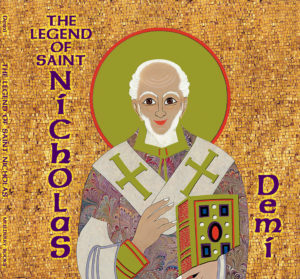When people tell you Santa Claus isn’t real, remind them that a heretic’s nose once begged to differ.

In my past life as a serious Evangelical, I refused to tell my children that Santa Claus is real. He’s a fake, fat old man who magically gives people stuff, but only if they deserve it. And apparently everybody deserves it, because everybody gets a present. That is, unless they’re so poor they can’t afford presents, in which case, obviously they weren’t very good people.
That wasn’t a very Christmassy way to go about things, was it? For years, I did what well-meaning parents often do, and gave the fat man the heave-ho. When you have a large family, you group them in sets, and each set gets an amazingly different childhood experience. In fact, the different children practically have a different mother as the family dynamics change and the grownups learn to relax a little. We should talk about that sometime, but this isn’t about that.
Anyhow, my oldest kids, the first set of three, knew good and well that Santa Claus is a contemptible secular joke, and he hardly entered our Christmas consciousnesses. (Oddly, one of my older ones, who I will leave nameless for the sake of the child’s feelings, believed fervently in the Tooth Fairy. I guess I figured if they knew Santa Claus wasn’t real, they’d know I was joking about the Tooth Fairy, but apparently kids don’t draw inferences the same way adults do. Learn from my mistake. There was real disillusionment when the truth became known about that.)
My next set, the middle three, have the experience of Santa as a pleasant family myth, and he fills the stockings, and it’s all good, clean fun. None of them ever thought he or the Tooth Fairy were real.
The last set of two (plus the rest of them, who’ve witnessed the evolution of our thinking over the years) get to hear about Saint Nicholas, the man. They’re still not getting the modern Santa Claus experience, because I still don’t let them think he’s actually a North Pole dweller dropping things down our chimney. That’s a fun story, but this is the true one:

Now, not being Orthodox or Catholic, we don’t pray to saints, or necessarily believe some of the myths that have grown up around them. For instance, I very much doubt that Nicholas actually stood up in the bathtub on the day he was born and sang praises to God. I guess that could have happened, if God wanted it to, but I have no reason to view that as a real event. I don’t put it outside the realm of possibility. Nor do I completely either affirm or deny the miracles he may have performed. God does all kinds of things, all kinds of ways, doesn’t he?
What he did do, though, for sure, was help the poor and punch heretics in the name of Jesus. I do wish the heretic-punching were in this book, but since it’s for children, I guess I can understand why not.
We talk about the way the St. Nicholas’s charity is honored by our hanging stockings as a reenactment of his filling of shoes with gold for the poor man’s daughters who needed a dowry. We find ways to help the poor and hurting around us to also have a blessed Christmas. We do indulge in a little pretend play, sometimes putting keto cookies out for the fat man, or jingling sleigh bells after the kids go to bed so they’ll know he’s HERE! Since Nana really does believe in Santa, we also make sure the kids don’t let her know he’s not real.
St. Nicholas is not the only Christmas tradition about which we’ve sadly lost our understanding. I remember a well-meaning preacher saying once “Why do we even have a Christmas tree? We don’t have a religious reason to do that, but I don’t know where else to put the presents!” Well, I do, and it’s not a pagan ritual. It’s a Christian thing to do. So we also talk about St. Boniface and his missions to the Germanic tribes when we put up our Christmas tree.
Far better than throwing out Christmas traditions just because we can’t remember what they mean, is re-emphasizing the history of the Church during this season. So many parents flub it up (in my opinion) by lying and making Santa a huge disappointment when the kids finally figure it out. It is far better to acknowledge the reality, and explain how it became mythologized. In the process, children learn how Christ was stealthily removed from the modern Christmas by makers of mainstream media who hate Him, and why this is wrong. Tossing out the celebratory and magical–let’s rather say miraculous–aspects of the season, as the Grinches and Scrooges would love us to do, is the opposite of honoring Christ.
Here are a few more resources to help you explain the truth of Christmas to your children. As the world grows ever more skeptical of the Incarnation, we need to up our believing game, don’t you think?
St. Boniface and the Christmas Tree
A Generous Spirit: The True Story of St. Nicholas
How about you? Does your family do Santa Claus? Elf on the shelf? Talk to me on Gab, MeWe, or Social Galactic.
